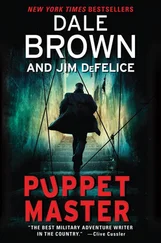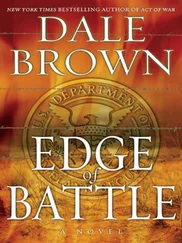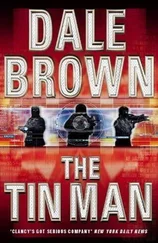He moaned again as she worked on his belt…but then he heard steps on the wooden stairs outside, rapid-fire running steps, and his body froze. Lidia detected the change immediately, got to her feet, and wordlessly retreated to a curtained-off area of the second room with the baby. Manuel was on his feet, an automatic pistol that was hidden in the chair cushion behind his head in his hand. He quickly stepped over to the window and peeked outside. It was his son, Manuelo, running up the stairs past his shanty. Manuel lowered the gun and was about to call out to his son to ask him where he was going, but something—a tenseness in his nine-year-old son’s young body—made him stop. Something was wrong. Something…
“I said stop!” he heard. Manuel ducked low. A PME officer ran up the stairs and grabbed Manuelo by the back of his neck. “Don’t you run away when I tell you to stop, asshole!”
“I’m sorry, sir, I didn’t know you were talking to me, sir,” Manuelo said. Pereira was proud of his son for staying cool and polite—the PME liked nothing better than to beat up on young orphans and street urchins to keep them in line. Politeness and showing respect went a long way toward survival in Brazil, especially if you were a kid.
“Who else would I be talking to, the damned fish?” the officer yelled. Pereira didn’t recognize him—he must be from outside São Paulo state. “What’s your name, boy?”
“Carlos, sir.” Carlos was his Catholic confirmation name, a lie that he could easily pass off as an honest mistake if questioned later. It was an unwritten code word in the shantytowns that you used your middle or confirmation name when being questioned by police, so your neighbors could support your lie for you. “Carlos Cervada.” “Cervada” was his mother’s “Portuguesed” Bororo name—again, only a half-lie.
“You’re lying. Your Indian name is Diai. You go by the name of Manuelo, in honor of your whore mother’s new husband.”
“I’m not lying, sir. I was taught never to lie to the police.”
“Shut up, bastard! You are lying, I say. Where do you live?”
“Right up there, sir,” Manuelo said, pointing.
“Where?”
“Right up there, sir. I’ll show you. My mother is there—can you see her?”
“I see a hundred women up there, boy,” the officer said. “Is your father at home?”
“My father is working, sir.”
“Where does he work?”
“At the docks, sir, for the Maersk Line. ‘Constant Care.’ That’s what they say all the time. I don’t know what it means, but…”
“You’re lying, boy. Your father is a deserter and a terrorist.”
“I’m not lying, sir. I was taught never to lie to an officer. The PME is here to help us. We must all do as the PME officers tell us. The PME is our friend. Isn’t that right, sir?”
“Where is your mother? Point her out to me.”
“Direita lá, senhor. Right there, sir,” Manuelo said. “Mamai! It’s me!” As expected, at least six or seven women waved back. “See? There she is!”
“You had better not be lying to me, boy, or I’ll beat you so badly you’ll wish you were dead. Now take me to her, imediatamente!”
“Yes, sir, right away, sir.” Manuelo scrambled up the steep steps, and the PME officer had to hustle to keep up with him. “Not much farther, sir.” He was leading him away from his father, giving him the precious seconds he needed to get away. “We’re almost there…”
“Slow down, bastardo!” the officer said. But that was Manuelo’s cue to bolt. He actually accelerated up the last flight of stairs, ran down a catwalk, and reached a ladder leading up to a roof of the lower tier of shanties. “Stop! I order you to stop!” the officer shouted. Pereira was proud of his boy for reacting so fast…but out of nowhere, another PME officer grabbed Manuelo just as he started climbing up the ladder.
“Nao!” Pereira shouted, and he raced up the stairs toward his son. The first PME officer, turned and pulled out a walkie-talkie to report making contact with his quarry. The second PME officer had grabbed Manuelo by the ankle, pulled him off the ladder, and was holding him with his arms pinned behind his back, making the boy cry out in pain. Like an angry lion, Pereira went up the stairs after him.
“Stop, Pereira!” the first PME officer shouted. He had drawn his sidearm and was pointing it at him. The second PME officer started dragging Manuelo toward the first officer, making Pereira freeze. “We just want you for questioning, that’s all,” the first officer shouted. “No need for…”
At that moment there was a loud “BOOOM!” from below. Lidia Pereira had appeared in the doorway of her shanty with a sawed-off shotgun and had aimed it at the second PME officer holding her son. The second officer cried out and let go of Manuelo, who immediately ran toward his father.
“Puta!” the first officer shouted, and he turned, aimed, and fired four shots. Lidia Pereira ducked behind a wall but the flimsy and half-rotted plywood could not stop a bullet. She screamed and slumped to the floor.
Clutching his son and momentarily forgetting all about the PME officers moving in from all directions, Manuel Pereira headed back to check on his wife. She had been hit in the left thigh and grazed in the left rib cage. “Lidia!” he shouted. “Hold on. I’m going to get you out of here.”
“I’m all right, Manuel,” she gasped. There was a large bloody hole in her leg, but thankfully the bullet that had hit her chest had not pierced her lung. “Take Manuelo and go.”
“Sergeant Pereira is coming with us, Mrs. Pereira,” the first PME officer said. Two other PME officers grabbed Manuel and handcuffed him behind his back. “I think we’ll take his son too, to ensure his cooperation.”
“Cowardly bastards…!”
“It is you who is the coward, Pereira, hiding behind your son and making your wife fight your battles for you. Get them out of here.” As neighbor women came to help Lidia, Manuel and his son were taken away by the PME. Several neighbors came out of their homes and looked on, and for a moment it looked as if they might try to take the Pereiras away from the PME, but more armed officers showed up and kept the crowd from getting out of control.
They were loaded into a PME van, but instead of being driven out of the harbor area to PME headquarters in São Paulo or Santos, the van detoured into an older, more isolated section of the waterfront. Garbage trucks were unloading onto huge piles of trash, while bulldozers were pushing the piles onto conveyor belts, which led up to garbage barges ready to be taken to nearby island landfills. When the PME van came inside, the entry lane was closed off; within a half hour, all of the trucks and the bulldozer operators had gone.
Manuel Pereira and his son were finally taken out of the van and over to one of the garbage piles, both still in handcuffs. Manuel didn’t need to ask why they were taken there—he knew all too well. Moments later, he saw Yegor Zakharov’s aide, Pavel Khalimov, and then he was certain. “So, the colonel didn’t have the guts to do this himself, eh?” he asked. “I knew he was a coward.”
“The colonel doesn’t have time to take out the trash,” Khalimov said idly. The big Russian looked at Pereira’s son, smiled, put away the silenced pistol he was holding, reached down to an ankle sheath, and flicked open a switchblade knife. “I had planned this to be quick, but now I think we’ll have a little fun first. Let’s see how the big tough Brazilian soldier boy does when he sees his son die before his eyes.”
“I was sure you’d bugger him a few times first—you are into little boys, aren’t you, Khalimov?” The Russian killer’s smile dimmed, and Pereira saw him swallow hard. “Or did your boss tell you not to bugger the victims before you killed them? Afraid you’d leave DNA traces behind that would lead back to him? I get it.” Pereira turned to his son and said, “This is Captain Pavel Khalimov, son. He rapes and kills young boys for fun, like that old one-eyed Colombian Feliz down on Pier Seventy-seven did before you and your friends took care of him. What do we do to perverts like that, son?” Manuelo expertly shot a glob of spit into Khalimov’s face. “Very good, son. That’s exactly what we think of corn-holing faggots like Khalimov here.”
Читать дальше












